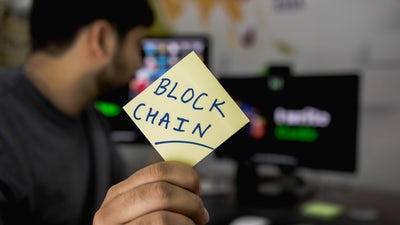
Innovation in Law: There is no time like the present to observe the disruption
September 20, 2019
The Future Lawyer Weekly Update – w/c 23rd September
September 23, 2019Fintech is the hot word in the world of business at the moment. The number of “Unicorns”(which refers to a fintech firm that is valued at over $1 billion) has risen to 39 worldwideand talk of blockchain amongst other Fintech trends are now commonplace. But how is Fintech changing the world we live in? Along with the optimism inspired by new Fintech terms often comes confusion.
An example of supposedly savvy investors becoming over-excited about Fintech is when the iced tea drinks company, then known as Long Island Iced Tea, changed its name in 2017 to “Long Blockchain Corp.”. This announcement saw its shares jump 200%when trading opened after the announcement. It soon became apparent that the drinks company only had entered the “preliminary stages” of exploring the opportunities of investing in blockchain. Fast forward to April 2018 and the radical new Long Blockchain Corp. had ditched their plans to invest in blockchain technology and were kicked off the Nasdaq stock exchange board after falling below the minimum valuation of $35 million. Then the Nasdaq started an investigation into whether the firm had deliberately misled investors.
Nevertheless, young Fintech firms are known as disruptors for a reason. 16 companies became Unicorns in 2018 and investment totalled $24.9 billionafter 52 mega-rounds of Fintech investment. The more they disrupt the current financial services, the more questions regulators have. The Student Lawyer examines the most promising parts of blockchain, one of Fintech’s main trends, and how regulators are tackling this fourth technological revolution.
Blockchain
What is blockchain?
Blockchain is a system of recording information without a centralised third party. It is made up of a chain of blocks that store information on transactions that are verified by a network of other computers. The block receives a “hash” (a unique code) once it has been verified. The blocks are ordered chronologically in a chain which helps prevent hackers from going unnoticed – if you change one it will not match with the others. Hence to successfully hack blockchain you would have to change every single block in the chain. This allows information to recorded but not edited.
An alternative danger would be if a hacker, or group of hackers took a majority control over 51% of the computers on a blockchain-based network (e.g. bitcoin). This would allow hackers to defraud the system and double spend the cryptocurrency. One group named “Bitfury” did at one point have control of 40% of blockchain network’s total computational power but vowed never to go over 40% as it would be self-defeating: users would sell their bitcoin in fear thus devaluing the cryptocurrency.
Generally, the pros and cons are:
Pros:
- No centralisation or third party required which reduces costs and makes it very difficult to hack
- The technology is completely transparent
- Computer verification reduces the possibility of human error
Cons:
- Slow rate of transactions (3-4 transactions per second on bitcoin, whereas Visa averages over 1600 per second)
- High technology and electricity cost to verify transactions (estimates claim that blockchain consumes the same amount of electricity as Ireland)
- A history of use for illegal activities
What can blockchain be used for?
- Cryptocurrencies– blockchain offers an alternative type of money that does not require a centralised system such as your bank or government. The transactions are verified by a network of computers for free rather than by banks or credit card companies like Visa and Mastercard who charge a fee for acting as the centralised third party.
One example of when a government has failed to effectively control their currency is Venezuela. Consequently, they launched the petro (a cryptocurrency issued by the government of Venezuela) in a dodgy unaudited fashion during February 2018. It only lasted until August 2018, but this does demonstrate how governments can attempt resolve a currency crisis using blockchain. With some countries, most notably Sweden, moving towards a largely cashless future it is becoming more likely that cryptocurrencies will be an attractive alternative. Attitudes on some cryptocurrencies are very disparate: China and Russia have essentially banned bitcoin, whilst the UK and Canada, for example, seek to use regulation to encourage the use of the digital currency. Cryptocurrency has even invaded traditional capital market instruments, with the Fintech firm Nivaura(who aim reduce the time it takes from issuance to market by 80% for bond issuances) was the platform behind the world’s first cryptocurrency bond issuance in 2017.
But cryptocurrencies are not free from hackers and theft. 2019has seen Japan’s BITPoint robbed of $28 million, Singapore’s Bitrue lose $4 million, and $40 millionand $10 million taken from Binance and GateHub respectively. In 2018 hackers stole a total of $1.7 billionin cryptocurrency.
- Smart contracts– blockchain allows contracts on a huge range of things to exist without need for a third-party intermediary. The “if-this-then-that” (IFTTT) code makes the system more transparent and allows for self-execution, meaning that contracts can be negotiated more quickly in real time.
Smart contracts are:
- Self-verifying
- Self-executing
- Tamper resistant
They:
- Improve transparency
- Reduce (or even remove) intermediaries)
- Reduce transaction costs
The uses of smart contracts are very wide ranging. They can be used not only by governmentsbut also in the music industryand health care, as well as for management and in finance. Personal health records, creating a decentralised data base of music rights that accurately pay artists in real time, digital contracts for real estate or tenancy agreements and digital voting are all very real possibilities that come with smart contracts. They can even monitor and make more efficient supply chains by reducing paper documentation.
- Identity– Blockchain technology allows you to have your passport, birth certificate and personal ID stored on a secure ledger (a part of the blockchain) that can better protect individuals from fraud or identity theft. Furthermore, with increased anger at data breaches, keeping personal data safe is very important to many. Having one form of digital ID rather than passports and driving licenses and birth certificates etc (physical forms of identification) would help protect people’s personal data and identity, whilst making fraud more difficult.
In summary, blockchain’s uses revolve around how we manage our data to allow individuals to interact more efficiently and securely. Whether that is cheaper transactions, faster contract negotiations or more secure voting systems, managing data is becoming a key focus for the future. Blockchain, which has now been around for a decade, is inspiring firms to find new answers to the accepted ways of managing data.
Regulation
With Fintech opening up a brave new world, there comes greater scrutiny and regulation. A subset of Fintech called Regtech has even burst onto the market to speed up and improve regulation in increasingly complex digital financial industries. This year the UK has seen the Financial Conduct Authority (FCA) spark into action.
January 2019: SETTING OUT THE PARAMETRES
The FCA provided draft guidance on cryptoasset regulation
- Provided new definitions that split cryptoassets into three regulatory categories: (1) Security Tokens, (2) Exchange Tokens, (3) Utility Tokens.
- Legal definitions of e-money
- Regulated activity carried out without permission will be punished by 2 years imprisonment
- The European Banking Authority (EBA) and the European Securities and Markets Authority (ESMA) followed up by acknowledging the need for more regulation of cryptoassets
February 2019: FUNDAMENTALS
The FCA made 3 key proposals in accordance with its principals:
- The extension of the FCA’s principals to e-money firms
- The extension of the FCA’s principals rules and guidance offered to bank customers
- News rule of the communication and marketing by e-money firms
The aim is to ensure that e-money firms behave responsibly and that consumers are protected from misleading “hype” via communications (as we saw in the Long Island Iced Tea turned “Long Blockchain Corp.” story above).
March 2019: The EU tackles GDPR & Blockchain, Cryptoassets and Smart Contracts
The EU Blockchain Observatory comments on 3 areas:
- SCALABILITY (how much something can grow) – sacrificing a degree of decentralisation to ensure scalability and security is advisable
- INTEROPERABILITY (a product system that works with other product systems) – blockchains must be able to share information with other platforms. An “off-chain entity” to act as a third party that can check transaction is advisable
- SUSTAINABILITY – the proof of work system (solving a difficult puzzle to verify transactions for a certain amount of cryptocurrency) is very costly as it consumes a large amount of electricity. Hence the proof of stake system is advisable (where those who mined the block take a transaction fee to verify a transaction) as it does not need such a large amount of electricity to solve a complex puzzle
April 2019: WHO YOU GONNA CALL?
A directory is issued over who are the regulatory authorities for cryptoassets
June 2019: The Bank of England’s (BoE) FUTURE OF FINANCE report
- The BoE announces that investing in regtech to better regulate these large amounts of data will be necessary (even if costly)
- Radical changes in the way consumers use money (now possibly in cryptocurrency) could greatly threaten banks. This has led the BoE to question the UK’s Open Banking reforms which force the 9 largest banks to share data with smaller competitors to improve competition
- The BoE identifies issues regarding regulating cross-border payments
Project Libra announced by Facebook
July 2019: BAN ON CRYPTODERIVATIVES
The FCA announced that it planned to ban retail consumers (consumers who take financial bets individually rather than on behalf of a firm) from buying crypto-derivatives (futures, options, contracts for difference etc) due to their volatility and the lack of research available to retail consumers.
Summary
Overall steps taken so far aim to protect consumers from poor investments in cryptoassets, whilst ensuring that blockchain technology can grow. But no big actions or plans had been publicised until Project Libra was announced in June 2019. It was planned to be launched in 2020, but regulators have demanded that the project be placed on hold to allow for greater scrutiny. Project Libra has also made Fintech and blockchain a political matter. Some of the concerns include:
- Governments’ loss of power to control monetary policy
- The accountability of cryptocurrencies, especially concerning cross-border transactions
- Whether data privacy be adequately protected (especially by a firm such as Facebook, with a poor record in this area)
- Whether the launch of Project Libra may be anti-competitive
This is forcing regulators to speed up their work. What remains to be seen is how strongly regulators and governments will react to blockchain and e-money. If they decide to support it through regulated means, it could revolutionise and destroy the current banking industry. If they decide to ban it, then this could severely limit blockchain’s potential in financial services. Alternatively, no law or government can officially determine what is tradable. That is up to traders (or consumers). Whatever happens, blockchain is asking regulators and governments unprecedented and important questions.
By Will Holmes





